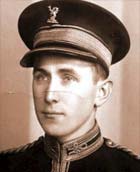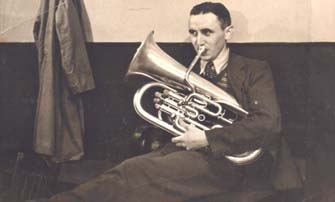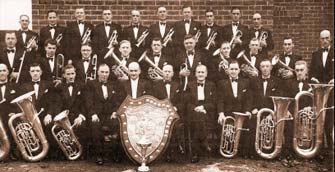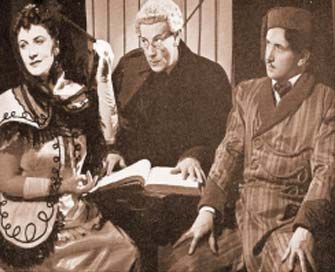|
Thanks for the Memory No 4:
ROWLAND JONES - The Prince of the Euphonium
by Chris Helme
 Enoch
Rowland Jones was born in 1912 and lived in the village of Gwaun-Cae-Gurwen
a small community on the outskirts of Ammanford and little more
that a bus ride from Swansea. He was born into a musical family
and was the only son of Timothy and Anne Jones, who also had two
daughters Peggy who was seven years younger and died several years
ago and an older sister Nellie Bronwyn who still lives in Gwaun-Cae-Gurwen. Enoch
Rowland Jones was born in 1912 and lived in the village of Gwaun-Cae-Gurwen
a small community on the outskirts of Ammanford and little more
that a bus ride from Swansea. He was born into a musical family
and was the only son of Timothy and Anne Jones, who also had two
daughters Peggy who was seven years younger and died several years
ago and an older sister Nellie Bronwyn who still lives in Gwaun-Cae-Gurwen.
In 1924 he was introduced and encouraged to play a brass instrument
by joining the Gwaun-Cae-Gurwen Silver Band by his uncle Dan Lloyd
who was the conductor of the band. Like all his contemporaries he
too went on to work at Steer Pit the local mine but his father felt
that Rowland had a gift for music and found him alternative employment
as an engine driver on the surface rather than going under ground.
His new band were no slouches either because they had taken part
in the National Brass Band Championships at the Crystal Palace the
year before he was born in 1911 and although the band played off
number three under the baton of T. J. Rees they were not amongst
the prizes that day. They followed that visit with another crack
at the Nationals the following year but even though playing off
what might have been described as a better draw - number ten they
were still not amongst the prizes.
The next time the band appeared at the Crystal Palace was in 1925
when Rowland as one of their youngest members would have never have
dreamt that he too would one day be a leading instrumentalist at
the Crystal Palace where he would be rubbing shoulders with some
the biggest names in the brass band world. The band took part again
in 1927 but on that visit the band played under the baton of Tal
Morris. I believe the last time Rowland played in the championships
with his village band was in 1931.
It was not long after that the 'talent scouts' of Yorkshire were
hearing about this rising star Euphonium player from the valleys.
It was Arthur O. Pearce the legendary conductor from the Black Dyke
Mills Band himself who took the day long train journey from his
native Queensbury to listen to Rowland in his own backyard at the
Gwaun-Cae-Gurwen bandroom. Arthur's thoughts on what he heard have
obviously not been recorded but he was sufficiently impressed with
what he heard because he invited Rowland to travel back up to Yorkshire
to audition for the vacant principal Euphonium position following
the departure of Percy Shaw.
On the 12th March 1934 after a successful audition he was invited
to join the Black Dyke Mills Band - which was in good time to appear
at the Crystal Palace with his new band under the baton of William
Halliwell performing John Ireland's test piece 'Comedy' - they were
awarded fourth prize behind the mighty Fodens Motor Works and Fred
Mortimer who took the coveted first place which then saw Fodens
complete their 1930's Crystal Palace treble. It was whilst he was
with Black Dyke as well as playing solo performances on the Euphonium
he was also invited to sing solos with the band as well.
During his tenure with Black Dyke they were rarely out of the
prizes at the 'Nationals' although they never actually took first
place during the five years he was with them - 1934 - 4th 1935 -
3rd although Fodens were not allowed to take part because of their
hat trick of wins Dyke could only manage a third prize behind Munn
& Felton's, 1936 - 2nd and it was Fodens who bounced back to
take the coveted first prize, led once again by Fred Mortimer, 1937
- 3rd again to Fodens who took the top spot, 1938 - 3rd and who
do you think it was who once again took the top spot - it was of
course Fodens who had now won the National Championships six time
out of the last seven years - the double treble. That was the last
time he performed with Black Dyke Mills following his resignation
on 24th March 1939 having been persuaded to join Bickershaw Colliery
Band under the baton of William Haydock.

Taken at Black Dyke Mills between 1934 & 1939 when he
was employed as the company gasman as well as their Principal Euphonium
player
It was later in the same year that he and two friends visited the
Greyhound Inn on the East Lancs' Road to order lunch for Christmas
Day as the war had started and they could not get home for Christmas.
Rose ann was the receptionist who took their lunch order; it was
this meeting which was the start of their great and long life together.
They were married in Leigh, Lancashire in September 1941 and made
their home at 11 Byron Grove in Leigh at a time when Rowland was
working in the pay office at Bickershaw Colliery. This was a busy
time for him as he was working during the day, then on night watch
for the Home Guard and then entertaining the troops with the band
during the evening and on top of all that he was taking singing
lessons with local singing celebrity Tom Burke as well - his ambition
at that time was certainly to be an opera singer - something that
has been encouraged by Arthur O. Pearce at Black Dyke.
On the contest arena during Rowland's eight year tenure with Bickershaw
the band faired well and thanks to Keith Hollinshead 1994 publication
'The Major and his Band' about the Abram / Bickershaw Colliery Band
the following results were recorded.
YEAR |
POS |
BELLE VUE |
CRYSTAL PALACE |
CONDUCTOR |
|
1939
1940
1941
1942
1943
1944
1945
1946
1947 |
4th
1st
4th
2nd
1st
3rd
3rd
1st
5th |
A Downland Suite
Clive of India
Choice of Three
Pageantry
Beethoven's 5th
The Tempest
Pride of Race
Salute to Freedom
Henry V |
No Contest
No Contest
No Contest
No Contest
No Contest |
W. Haydock
W. Haydock
W. Haydock
W. Haydock
W. Haydock
W. Haydock
H. Mortimer
H. Mortimer
H. Mortimer |
It was in 1946 when Eric Ball composed his first piece for the
Belle Vue British Open Championships 'Salute for Freedom' the piece
could have been written for Bickershaw - the opening called for
a lyrical Euphonium performance - and with no one better it could
have been Rowland Jones swan song leading the band to first place
and then going on to join the Sadler's Wells Opera Company in 1947.

Bickershaw Colliery Band - 1946
Back Row:
(left to right): Clifton Jones; W (Bill) Clegg; A. Coultas; Joseph
(Joe). Nightingale; Jack Mawdesley; Robert (Bob) Clarke; Edward
(Ted) Farrington; Harry Gray; W. Horrabin; Ted Gray (Snr)
Middle Row:
Herbert (Bert) Healy; Peter Gill; Harry Pollard; H. Pownall;
J. Gregory; Vince Preston; W (Bill) Gill; Charlie Hulse; J. Mather;
E. Nesbitt
Seated:
A. Hicks; Jack Wilson; Walter Wilding; Fred Fogarty; William Haydock;
Lt Col Ernest Hart MC; H. Jackson; E. Rowland Jones; William (Bill)
Gregory and W. Dawber
It was whilst he was a member of the Bickershaw Colliery Band that
he was first introduced to Tom Burke who had been a noted professional
pre-war tenor singer and someone who was well known at Covent Garden
- he had initially heard Rowland sing at one of the Bickershaw's
band concerts as a member of the audience.
It was he who suggested that Rowland should take up singing seriously.
Having discovered him it was then Tom who went on to give this amateur
tenor the professional tuition that was to give him a new career
away from the world of brass bands.
His successful audition for a place at the Sadler's Wells Opera
Company was held in July 1946 in Manchester - having been accepted
he was given his first professional singing role by Sadler's Wells
in the September of that same year making his debut as 'Turrido'
in Mascagni's Cavalleria Rusticana.
In September 1947 he fulfilled a promise he made to Major Hart
at Bickershaw that he would compete with the band at Belle Vue at
the British Open for the last time. He is likely to have been one
of the few if not the only brass band soloist to both stand up and
play an instrumental solo and then perform a vocal solo on the same
programme.
His debut as 'Turrido' in Mascagni's Cavalleria Rusticana was the
catalyst to his future success - from then on he was given most
of the major tenor roles in the repertory. It has been said that
he was at his best in Slavonic roles such as 'Jenik' in the Bartered
Bride and 'Lensky' in Eugene Onegin.
These successes saw him being cast for the part of 'Boris' in the
first British performance of Janacek's Katya Kabanova in 1951. This
had never been heard in England until this 1951 performance and
was a major event in the history of opera in England.
For Sadler's Wells he was their 'Alfred' in almost all their performances
of Die Fledermaus - a role he was performing when they moved to
their new home at the Coliseum Theatre in London.
He was with Sadler's Wells for the next twelve years - for many
of those years as a principal artist and then with the Welsh National
Opera Company. It is said that his most famous role was that of
'Rodolfo' in Puccini's opera La Boheme.
In 1945 their first daughter Sybil Roishna was born in Leigh and
shortly after moving to Middlesex their second Sally Reburn was
born in 1952 in Ealing. It was during their time in Middlesex that
Roseann bought a sweet shop in Southall to supplement the family
income after the war years. From this home they moved to Ruislip
where Rowland was working as a free lance singer with The Welsh
National Opera Company, the English National Opera Company the Covent
Garden Opera Company and at such prestigious venues as the Dublin
Grand.

From Act III Die Fledermaus - after the ball the whole company
go onto prison where Alfred (Rowland Jones) is held in place of
Eisenstein who disguised as a lawyer is trying to find out from
Rosalinda and Alfred exactly what has taken place between them.
He was also a prolific broadcaster for both the B.B.C and B.B.C
Wales - during this time he was also a singing tutor at the Guildhall
School of Music where he taught many people who themselves were
to become well known professional singers. His successful musical
career also included singing at the 'Proms' in London.
On July 1st 1969 along with 15 other famous Welsh singers Rowland
was invited to perform at the investiture of the Prince of Wales
at Caernarfon Castle in front of 4,000 guests who were inside the
medieval walls with thousands more watching from the dry moat and
millions more from around the world watching on television.
Rowland and Roseann decided to move back to Wales and during 1972
and 1973 had a house built in Llanrhaeader in Clwyd. This also gave
him the opportunity of accepting a post as peripatetic teacher where
he taught at Rhyl, Bangor, Chester and Cardiff Castle. In his home
he also had a studio where he had a busy schedule teaching private
students.
Throughout his career he travelled extensively and was heard singing
regularly in many different countries including Germany, Brussels,
Turkey and each year he would perform at the Battle of Britain commemoration
in Jersey as the guest artiste.
One of his last performances in Amman Valley was in the oratorio
'Elijah' performed by the Brynaman Old Age Pensioners in 1976. After
a life time in music this former miner died on August 28th 1978,
aged 66, he is survived by his wife Roseann and daughters Sybil
and Sally.
It was the people of his adopted home in Llanrhaeader who helped
to establish the Rowland Jones Award which is presented annually
at the National Eisteddfod an event where he was in regular demand
as a judge for the brass and singing sections.
Speaking to Geoff Whitham the doyen of the brass band world about
Rowland - Geoff's immediate comment was that as a person he was
what you would describe today as a real character and a gentleman
- he was a man who was only too pleased to help someone.
During his early days at time at Black Dyke he stayed with Principal
Trombone player Hayden Robinson and his family until he found his
own accommodation. Whilst at Black Dyke he too was given a job at
the company just as every other player was in those days - he was
employed as the company gasman, the man who visited all the mill
houses owned by John Foster's - occupied by many of the employees
of the company to read their gas meters.
Even today he is still remembered in Queensbury - the family of
a former tenant of John Foster's recalled when he used to call at
their grandmother's home - an elderly lady who was blind - Rowland
would make his regular call to read the meter and then their grandmother
would always make him a cup of tea - he would always reciprocate
the kind gesture by singing one of her favourite songs before he
left.
As a youngster Geoff was introduced to him by Arthur O. Pearce's
son Harold as a fellow Euphonium player. Back in those days young
Geoff was a singer in the village church and Rowland would come
along help out by singing the tenor parts.
One of Geoff's most lasting memories of Rowland was back in the
days when he was the Musical Director at Hammonds Sauce Works Band.
At one particular concert he contacted and persuaded Rowland to
come along and be the guest soloist - being the gentleman he readily
agreed for his old friend but only on one condition that he would
play as long as Geoff played as well. What a night that must have
been when two of the finest Euphonium players of their respective
generations stood together on the same stage and played Drigo's
'Serenade'.
Whilst there are many old bandroom tales about these old time players
and whilst some may be true and others are perhaps more wishful
thinking with a hint of exaggeration. Here is at least one true
story about Rowland Jones or is purported to be.
After almost twenty years of not playing a Euphonium he had the
opportunity whilst visiting the band from his childhood days of
picking one up for the first in more years than he cared to remember.
When asked if he had played recently he informed the gathered audience
of old friends '…No, not for many years…' He was then
invited to try out a Euphonium from the bandroom upstairs - on his
own and in the privacy of the rehearsal room he did. Apparently
what Rowland did not know at the time was that all his friends could
hear every note he played. It is said that even after so long he
could play that well known Euphonium solo 'Grandfathers Clock' at
speed and clarity of sound - for a moment you felt whilst listening
that he had never been away.
It has been said by his old friend from the Gwaun-Cae-Gurwen Silver
Band days Glynn Newlands who was one of Rowland's life long friends
that he always kept his mouth piece in his pocket for good luck
It was during his years at Black Dyke and later with Bickershaw
Colliery Band that he was dubbed the 'Prince of the Euphonium'.
Sadly from my own research to date I have not found any recordings
where he was a featured Euphonium soloist- I would be pleased to
hear from any readers who can remember hearing Rowland Jones play
or have any special memories of him.
The only recording of Rowland performing as a soloist I have found
was in 1963 when he recorded and 'LP' under the Saga label No: XID
5171 '…Rowland Jones sings the World's Best Loved Songs…'
with the Serenade Orchestra.
In the course of researching this story I have been able to make
contact with Rowland's family and I am grateful for the help and
assistance they have given to ensure this account of his life is
accurate but in particularly for the help given by his wife Roseann
who also sends her regards to all those that remember Rowland from
the old days at both Black Dyke and the former Bickershaw Colliery
Band.
Previous 'Thanks for the Memory' articles:
• No. 3: Louis Allison - more...
• No. 2: Willie Barr - more...
• No. 1: Derek Garside - more...
© Chris Helme 2002
© 4BarsRest
 back
to top back
to top
| 
